
Debs Newbold
Local writer and storyteller, George Murphy interviews local characters and personalities
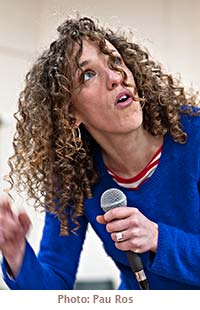
Debs Newbold is a theatre artist who lives with her husband Alan on the side of a hill in between Hebden Bridge and Todmorden. An award winning performer, director and playright, Debs has created work for venues such as the Royal Opera House, the Southbank Centre, Hay Festival and the RSC as well as Shakespeare’s Globe, where she has a long association. Debs is also one of the UK’s foremost performance storytellers.
Her collaborations with renowned director John Wright have helped re-define contemporary storytelling, resulting in two acclaimed shows; Under Her Skin & Lost In Blue. A third, Outrageous Fortune, which was due to go on National Tour in 2020 before COVID-19 hit, has now been made into a film.
In 2019 Debs’ play Rising Up, inspired by the legacy of the 1819 Peterloo massacre, opened at HOME in Manchester in October 2019 before going on national tour.
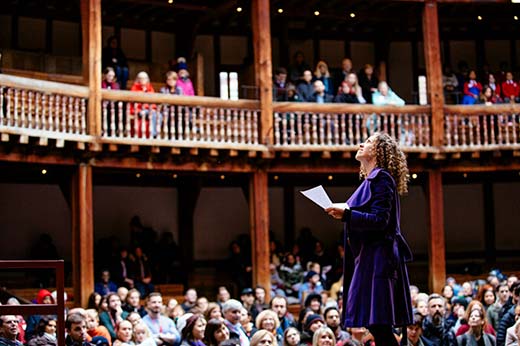
Debs Newbold, playing to the Globe Gallery - photo by Cesare De Giglio
Debs is Storytelling Consultant for Shakespeare’s Globe and her one-woman adaptations of Shakespeare’s tragedies have toured internationally – and have even been performed at Stubbing Wharf!
Born in Birmingham to a family with Irish roots, Debs has also lived in Manchester (where she went to University) and London (where she went ‘for one year’ in 1997 and ended up staying for 19). But she lost her heart to the Pennines when her aunty Eileen moved to Tod and her nan to Walsden in the mid-90s. Slowly much of the family followed suit, including, eventually, her mom and dad. Debs and Alan married in Hebden Bridge in 2010, and were the very first couple to be married in the Town Hall. They finally moved here in 2016.
Debs loves walking and swimming in all weathers, and is never happier than when sitting on a rock somewhere with a flask of tea, a couple of bourbon biscuits and a good poem or story to read. She has recently been adopted by a 20 year old black cat called Bubsy, who obviously realised that Debs was not a ‘cat-person’ and decided she needed to be rehabilitated.
Debs Newbold Q&A
Debs, first of all, how has Lockdown been for you?
A bit like being in a David Lynch film; strange, at times horrible but with occasional moments of transcendent humour and beauty that threw all the horror in to sharp relief.
I have been lucky and I do not take that for granted.
When did you first become interested in theatre work?
I have been interested in theatre for as long as I can remember.
I wrote short skits – I grandly thought of them as plays – for my school class assemblies when I was 7 or 8. I had amazingly patient and indulgent teachers. Mrs. Campbell even put up with me presenting one ‘play’ doing a terrible impression of her. I remember aged 5 being picked for a school play to play a chicken. My teacher breezily asked if I would be a grey or a speckled hen. I was adamant that it be speckled and made sure that my costume accurately reflected that.
As for theatre being work; I realised it was the job I would like to do when I was about 14. But I wasn’t sure how possible that would be. I m still not sure.
Which people inspired you early in your career?
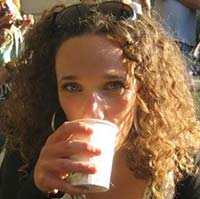 Victoria Wood, Blackadder, Douglas Adams, Edward Lear, my nan. My youth theatre director, a remarkable woman called Julia Smith. Cathy Burke, Angela Carter, Paula Rego. I love the dark nestled with the light. My family are a huge influence; most of them have a way with a story.
Victoria Wood, Blackadder, Douglas Adams, Edward Lear, my nan. My youth theatre director, a remarkable woman called Julia Smith. Cathy Burke, Angela Carter, Paula Rego. I love the dark nestled with the light. My family are a huge influence; most of them have a way with a story.
I also have this thing where I get a sense of texture and colour from intangible things. The texture of music and poetry is a big thread running through me, and started when I was really small with nursery rhymes and The Beatles. These things still influence me now.
My fascination with Yoko Ono was born aged about 13 and still continues. Fiona Shaw was a theatre hero from an early age too. And Julie Walters. I am a Brummie. Julie Walters forever.
I first saw you at The Festival at the Edge when you performed Lost in Blue. I was fascinated by the technical effects you employed and gripped by your tale. Did you draw from your theatre work to create that show?
The story was the main driver. I wanted to find the story, and once I found that, I knew how I wanted to do it; I wanted to dramatise the act of telling a story. Storytelling is an immediate and personal thing, so if you dramatise the story you are telling it loses something. My focus stayed with the audience, and on the characters and the tale I was telling. Meanwhile you could watch me absent mindedly get on with manipulating mics and buttons and glasses of water to make the sounds for the story. Put together, that all said something. I hope.
Certainly, don’t think I could have made that storytelling show without my background in theatre.
Globe theatre - that must have been a great breakthrough for you?
The most amazing break. That theatre space made a storyteller out of me, as well as a better actor. And it gave me my love of Shakespeare.
So you haven't always loved Shakespeare?
No! I studied English Literature at University and we did Shakespeare; I loathed it. I felt it wasn’t for me, it was elite, boring and had nothing to say to me. That is because I was reading it out of a book. When I was at Goldsmith’s doing my MA our singing teacher, an amazing artist called Helen Chadwick got messing around with scenes. As soon as I saw it come off the page, and played about with it myself, aloud, I began to get involved.
Shakespeare’s verse is musical. It is also a handbook for how to stage the play; it has directorial instructions that he left in there for his company because they worked fast and had no director. So if you know where to look, he is there, beyond the grave, helping you. It also makes sense of the language in that it is not there simply to be ‘poetic’, it is giving you an instruction: When Romeo says of Juliet “See how she leans her cheek upon her hand” it is the playwright speaking to the actor playing Juliet.
There are so many examples of Shakespeare directing you dramatically just through what his characters say. It is extraordinary. Do Act 2 scene 2 of Macbeth according to the rhythm Shakespeare writes and you don’t even need to act – it will be the tensest scene you have ever experienced.
When I watched you perform Romeo and Juliet at Stubbing Wharf (to a packed house) I thought how challenging it must have been to bring your own words to explore the Bard’s telling. I confess I was reaching for a tissue before the end. Have you enjoyed the challenge of ‘taking Shakespeare into schools’?
Yes, very much. And not just because it is Shakespeare. I like inviting people in to something that is seen as the preserve of the ‘elite’. Growing up I honestly thought I was not the kind of person who could ‘get’ Shakespeare. But art is for everyone. And everyone can be given a way in. I am happy to do my teeny tiny bit in that. And besides, kids love the stories. Shakespeare spins a good yarn. The stories themselves are brilliant. That’s the main reason I tell them.
Where and when did you meet Alan?
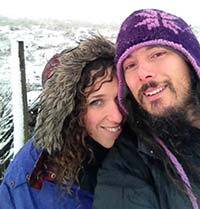 I saw him going up the stairs with his suitcase and a guitar on the day I moved in to my halls of residence in Manchester as a 1st year undergraduate. Two days later he offered me some pasta bake and we chatted for about 3 hours about the alt rock group Jane’s Addiction. We were pretty much inseparable from then on. Even after I discovered that he couldn’t actually play that guitar.
I saw him going up the stairs with his suitcase and a guitar on the day I moved in to my halls of residence in Manchester as a 1st year undergraduate. Two days later he offered me some pasta bake and we chatted for about 3 hours about the alt rock group Jane’s Addiction. We were pretty much inseparable from then on. Even after I discovered that he couldn’t actually play that guitar.
First couple to marry at our new Town Hall! They can’t take that away from you. How did the day go?
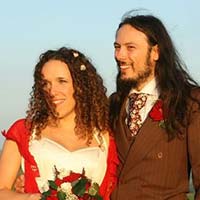 It was loose and funny and perfect. Married at the town hall, drinks in the sun at the Shoulder of Mutton with our friends morris dancing for us, fish and chips at AJ’s on the corner of Market Street and a big dance up at Heptonstall Bowling club.
It was loose and funny and perfect. Married at the town hall, drinks in the sun at the Shoulder of Mutton with our friends morris dancing for us, fish and chips at AJ’s on the corner of Market Street and a big dance up at Heptonstall Bowling club.
We had been together for 15 years by then so it was a very relaxed affair. We had just planned a 15 year anniversary party; we weren’t planning to get married at all. But we realised that there was a ‘thing’ missing at the centre of the party and that was us. So we thought – ah, why not? It turns out that getting married is one of the most romantic things you can do. Who knew?
What’s this with talking to cats?
Bubsy is very talkative. She is elderly and deaf but still likes the sound of her own voice. She can predict weather and often comments with some eloquence on how the humidity of the south Pennines affects my hair. Amazing for anyone, but especially a cat.
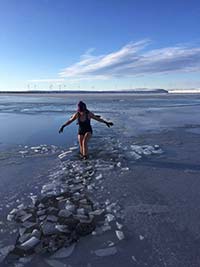 When and where did you first go wild swimming?
When and where did you first go wild swimming?
Bognor Regis, aged 14 months. I had steadfastly refused to bother learning to walk; considering my father’s shoulders a perfectly adequate way of getting about. The story goes that on our first day on holiday I saw the sea and wriggled like a crazed worm to get off my dad’s shoulders.
I took my first steps towards the waterline and I have been in and out of open water regularly since.
Hobbies? Are you still painting? What else do you get up to?
I still paint; I was given an amazing insight in to abstract oil painting by Dominic Vince at Northlight. I took his classes for three years. Just brilliant (the classes, not my abstracts!). This last year has seen me do even more gardening than I used to: I have always been mad for a spade and a bag of seeds. Walking, swimming. Dancing in my kitchen. I also read greedily. My nose and books are well good mates.
You have written and directed, been a star turn on the storytelling circuit and worked with a famous theatre company. If you could only cling to one of those passions, which would it be?
If this year has taught me one thing, it has taught me that I love and need live performance (both to do it and to see it) more than I realised.
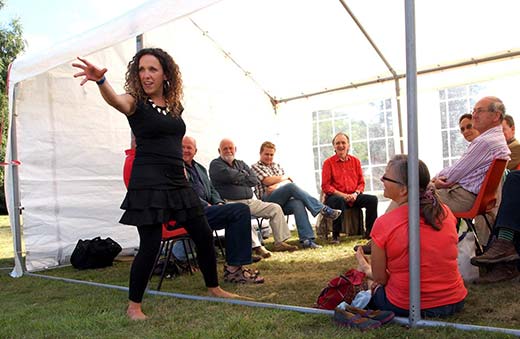
Debs Newbold making making Martin Carthy laugh
You were the first performer at Shaggy Dog after the Boxing Day floods. That was a very special occasion. You told Bawdy Tales, drawing from a French writer. There was lots of interaction with your audience - is that one of the strengths of storytelling as opposed to traditional theatre?
Storytelling and theatre exist in very close proximity for me – though I know this opinion is informed by my own very specific experience and preferences.
In particular, storytelling allows you to exist in two places at once; in the room with the audience and inside the story. You are a bridge between the two. It is fun to play about with that and can be very affecting and powerful too. It is something you can do with some plays, as well, but not all. Storytelling, however, always gives you that license.
How have you and your wider family enjoyed living in Calder Valley?
We love it. Honestly. It is heart-stoppingly beautiful here. And the people are fab.
What makes you laugh? I think you are a Les Dawson fan?
A: Les Dawson was a master of thwarted poetry. His sketches I can take or leave – for lots of reasons – but the way he could spin a beautiful poetic image about the dazzling beauty of the cosmos and then undercut it with “and I thought: I really must get a roof put on this toilet” is genius. It doesn’t sound it, does it, written here? But it is his exquisite pitching and timing. It is the same with his piano playing, exactly the same thing. That kind of thing makes me laugh. I am quite ready to laugh, me. Lots of things tickle me. One legged pigeons. Squirrels who cannot remember where their nuts are. Chris Morris. Caroline Aherne. Douglas Adams. I am just making a list now, so I will stop.
Julie Walters forever, by the way.
Favourite piece of music?
A: Birdsong on spring mornings.
Which question do you wish I had asked - and how would you answer?
A: Well I am a freelance artist coming out of lockdown, so it'd have to be: When can we next see you perform?
Well thank you for asking that, George. You can see me perform live or online agaiin, starting in July. On 12th July I will be on good old Zoom telling Romeo and Juliet at www.Lichfieldstorytellers.co.uk. Then on the 15th I am in Wales at the Willow Globe Theatre with King Lear. And to top a busy week off, I am booked at Festival at the Edge, the UK's oldest storytelling festival from 16th-19th July.
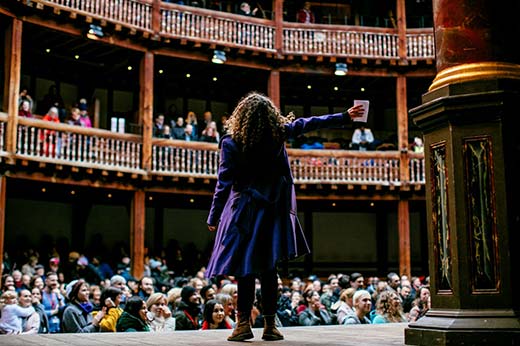
More HebWeb interviews from George Murphy
If you would like to send a message about this interview or suggest ideas for further interviews, please email George Murphy

